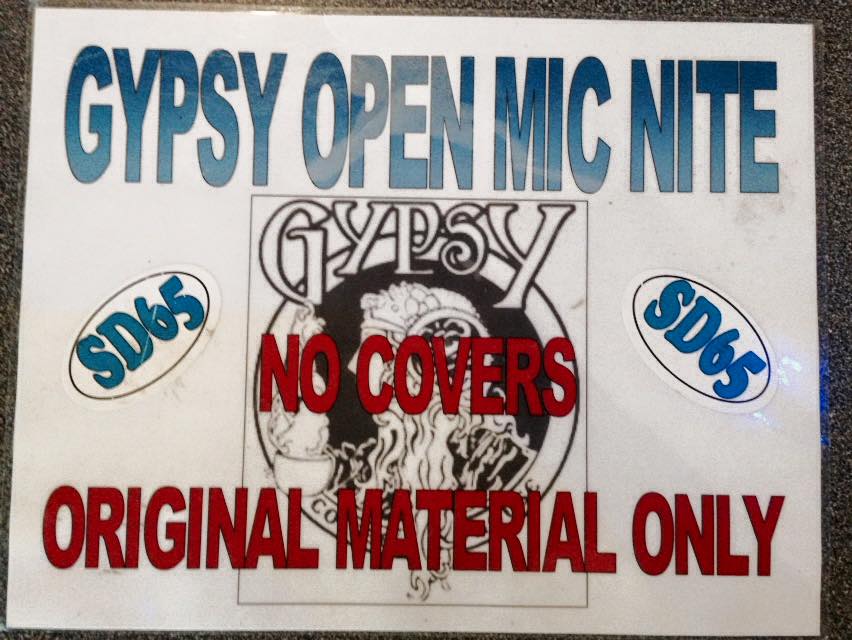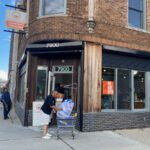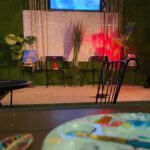Having hosted a short-lived open mic in Raleigh—like, 9 months short-lived—I can’t help but be impressed by an event that’s managed to last across years. Honestly, so many things can drive an open mic under…
(NB: After I wrote this post, my open mic found a new venue and it’s awesome.)
Hosts and organizers get into tiffs, get bored, get jobs, have kids, move to other towns. Venues close or change their event calendar—like scheduling some damn thing called “Beer and Banjos” on top of your time slot and blithely offering your open mic the audience-repelling start time of 9:30 pm. On a Tuesday.
I mean, hypothetically (or not). And not that I’m bitter. (I so am.)
However they’ve done it, open mic at the Gypsy Coffeehouse in Tulsa has outlasted and outplayed for 13 years. I didn’t get a chance to talk much with the host, Super Derrick, but he had that been-around air to him, so my guess is he’s been running the show a while.
The Space and the People
The venue had a funky coffee shop feel, with mismatched furniture, weird things on the walls, good coffee, and awesome pumpkin cheesecake. But the layout worked against the show in some unfortunate ways, all related to a lack of separation between stage and audience.
More or less in the middle of the space, the stage area was an invention of well-placed carpet remnants, speakers, and mic stands. I’ve seen this (and plenty other weird arrangements) work well enough at other venues. You don’t need a true stage or fancy gear to make an open mic work, but…
- When the aisle from door to counter runs right between microphone and audience, it’s difficult to get an Italian soda or find the ladies’ room without disrupting the mood.
- When the seating extends out to both sides and sorta behind the performer, with floor-to-ceiling columns blocking the view, it’s hard to make eye contact.
- When the stage area is lit the same as the seating area, the audience doesn’t get that subliminal visual cue to pay attention or talk softer, let alone stop talking, while someone performs.
Together, it conspired to encourage to some pretty lousy audience behavior—people failing to wait until a break in the performance before crossing in front of the stage, one jerk who kept shouting across the room, and three girls wrestling and giving piggyback rides (I know, what?) near the stage.
Your Host, Super Derrick, on Bass
Now I’m a firm believer that a good host can manage any logistical problem. Sadly, Super Derrick wasn’t very host-y. He did lay down Gypsy’s only two rules and he did reinforce them:
- All material must be original – noted on not one but two laminated signs placed on the floor near the mic, just in case someone forgot where he was, lapsed into a shoe-gazing reverie, and contemplated doing a cover.
- Slots are 10 minutes – ensured by means of a nice big timer easily seen from the mic so you’d know how much time was left without having to ask.
Other than that, Super Derrick’s attention focused on spanking along on electric bass, in concert with the house drummer.
He didn’t give the audience any suggestions—let alone rules—regarding their behavior. He didn’t give the night much structure at all really, whether because he figured everyone already knew or because he just came to play, I dunno.
The Amps and the Pedals…Dear Lord, the Pedals
Of all the open mics I’ve been to, this is the first that totally catered to electric guitarists. They had amps a-plenty, a Cry Baby wah pedal and some unholy orange thing whose purpose seemed to be to make already loud sounds louder, and a Jeff Spicoli-lookalike roadie deftly turned amp knobs and moved said pedals around a few times.
This, clearly, is what the host is into. These are his people. So that’s who showed up.
The Players, Their Guitars, and Their Not-Exactly Jokes
When the list opened, a line of 12 guys with bad haircuts and holes in their jeans formed immediately. In the end, of the 16 slots, we had 2 poets (including me), 4 comedians, and 1 keyboard player. The rest were all screamy guitar boys.

Good players, some of them, but kinda low on performance. I don’t recall a one who actually looked at the audience, each preferring to perform to the back of the room, the amps, the floor, the inside of his eyelids, and/or (for those whose barbers are but a distant memory) a privacy curtain of his own hair.
The comedians, I’m sorry-but-unsurprised to say, served as a reminder of why my former co-host and I banned jokes from our open mic: Their material was vulgar without cleverness* and their nerves were jittery and nauseous enough to make the audience sweat despite the Oklahoma air conditioning.
As my stalwart friend noted afterward, the saddest of these boys came to the mic, it seemed, not so much to try to be funny but to try to not throw up.
Praise be, he succeeded at that, at least.
The Conclusion (with Disclaimer)
It’s pretty clear I’m not the demographic or the talent Gypsy caters to. But I’ve definitely enjoyed a few open mics that were more about music than poetry, including Corey’s Grilled Cheese in Charleston. It’s also possible I was a little cranky from being on travel for a few days, this being the first time I’ve done a trip quite like this.
Or maybe I’ve just been spoiled by skilled hosts, respectful audiences, clear rules of engagement, and strong talent in places like Norfolk and Bryan, TX.
Whatever. All I can say for Gypsy is that I went to see what it was like and now I know. And so, I guess, do you.
*If you ever meet a man in Tulsa whose bicep tattoo reads “RUDE,” believe him.




